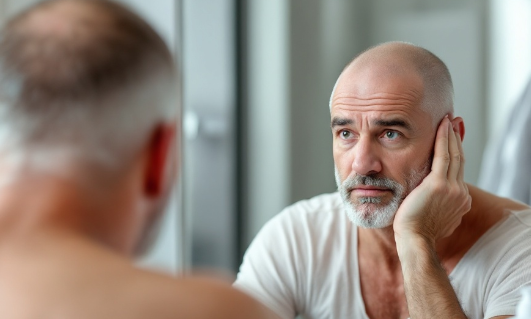Hair loss is a common concern that affects millions of people worldwide. It can occur for various reasons and impact both men and women at different stages of life. Understanding the causes, available treatments, and potential for regrowth can help those experiencing hair loss make informed decisions about their health and appearance.
Table of Contents
Key Takeaways
- Hair loss affects millions of people worldwide, both men and women
- Common causes include genetics, hormonal changes, medical conditions, and aging
- Various treatment options are available, from over-the-counter products to prescription medications and surgical procedures
- Hormone optimization therapy may help address hair loss caused by hormonal imbalances
- Early intervention and a holistic approach to health can improve outcomes for many people experiencing hair loss
Understanding the Hair Loss

To grasp the complex nature of hair loss, it’s essential to understand the natural hair growth cycle. This process consists of three main phases:
The Anagen Phase
The anagen phase is the active growth period of hair follicles. During this time, hair grows about half an inch per month. This phase typically lasts between two to six years, with some people experiencing longer growth periods.
The Catagen Phase
Following the anagen phase, hair enters a short transitional period called the catagen phase. This lasts about two weeks, during which the hair follicle shrinks and detaches from its blood supply.
The Telogen Phase
The final stage is the telogen phase, also known as the resting phase. This period lasts about three months, after which the hair falls out naturally. As one hair completes its cycle, a new hair begins to grow in its place.
Understanding this cycle is crucial because disruptions at any stage can lead to thinning.
Common Causes of Hair Loss

Hair loss can result from various factors, often working in combination. Some of the most common causes include:
Genetic Predisposition
Hereditary hair loss, also known as androgenetic alopecia, is the most common cause of hair thinning. It affects both men and women and is influenced by genetics and hormonal factors.
Hormonal Changes
Hormonal fluctuations can significantly impact hair growth. These changes may occur during pregnancy, childbirth, menopause, or as a result of thyroid problems.
Medical Conditions
Several medical conditions can lead to hair thinning, including:
- Alopecia areata (an autoimmune disorder)
- Scalp infections
- Trichotillomania (hair-pulling disorder)
- Certain skin conditions like lichen planus and lupus
Medications and Treatments
Some medications and medical treatments can cause hair thinning as a side effect. These may include:
- Chemotherapy drugs
- Blood thinners
- Antidepressants
- Beta-blockers
- Certain acne medications
Nutritional Deficiencies
Poor nutrition or sudden weight loss can lead to hair thinning. Deficiencies in iron, protein, and certain vitamins can affect hair health and growth.
Stress and Trauma
Physical or emotional stress can trigger a type of hair thinning called telogen effluvium. This condition causes hair to enter the resting phase prematurely, leading to increased shedding.
Diagnosing Hair Loss

If you’re experiencing hair loss, it’s important to consult with a healthcare professional for an accurate diagnosis. The process may involve:
Physical Examination
A doctor will examine your scalp and hair pattern to determine the type and extent of baldness.
Medical History Review
Your doctor will ask about your family history, medical conditions, medications, and lifestyle factors that may contribute to baldness,
Blood Tests
Blood tests can help identify underlying health issues or nutritional deficiencies that may be causing hair thinning
Scalp Biopsy
In some cases, a small sample of scalp tissue may be taken to examine the hair follicles more closely.
Treatment Options for Hair Loss

There are various treatment options available for hair loss, depending on the underlying cause and severity of the condition:
Topical Medications
Over-the-counter and prescription topical treatments can help slow hair thinning and promote regrowth. Minoxidil is a common example, available in both male and female formulations.
Oral Medications
Prescription medications like finasteride can help block hormones that contribute to hair loss in men. Women may be prescribed spironolactone or other anti-androgen medications.
Platelet-Rich Plasma (PRP) Therapy
This treatment involves injecting a concentration of platelets from your blood into the scalp to stimulate hair growth.
Hair Transplantation
Surgical procedures can move hair from areas of thick growth to thinning or balding areas. Techniques have advanced significantly in recent years, producing more natural-looking results.
Low-Level Laser Therapy
This non-invasive treatment uses light energy to stimulate hair follicles and may improve hair density in some people.
The Role of Hormone Optimization in Hair Loss Treatment
Hormone imbalances can play a significant role in hair loss for both men and women. Optimizing hormone levels through targeted therapy may help address this underlying cause and promote healthier hair growth.
Testosterone and DHT
In men, an excess of dihydrotestosterone (DHT), a byproduct of testosterone, can contribute to male pattern baldness. Hormone optimization therapy can help balance these levels.
Thyroid Hormones
Both hypothyroidism and hyperthyroidism can lead to hair loss. Proper diagnosis and treatment of thyroid disorders can often improve hair health.
Estrogen and Progesterone
For women, fluctuations in estrogen and progesterone levels, particularly during menopause, can contribute to hair thinning. Hormone replacement therapy may help in some cases.
Lifestyle Factors That Affect Hair Health
In addition to medical treatments, several lifestyle factors can impact hair health and potentially reduce hair thinning:
Nutrition
A balanced diet rich in proteins, vitamins, and minerals is essential for healthy hair growth. Foods particularly beneficial for hair health include:
- Eggs
- Fatty fish
- Nuts and seeds
- Leafy greens
- Sweet potatoes
- Berries
Stress Management
Chronic stress can contribute to baldness. Implementing stress-reduction techniques such as meditation, yoga, or regular exercise can be beneficial.
Gentle Hair Care
Harsh hair treatments, excessive heat styling, and tight hairstyles can damage hair and contribute to loss. Adopting gentler hair care practices can help maintain hair health.
Scalp Care
A healthy scalp provides the foundation for healthy hair growth. Regular cleansing and moisturizing can help maintain optimal scalp conditions.
Psychological Impact of Hair Loss
Hair thinning can have significant psychological effects, impacting self-esteem and quality of life. It’s important to address these emotional aspects alongside physical treatments.
Coping Strategies
Developing coping strategies can help individuals deal with the emotional impact of hair loss. These may include:
- Joining support groups
- Seeking counseling
- Exploring different hairstyles or head coverings
- Focusing on overall health and well-being
Emerging Treatments and Research
The field of hair loss treatment is constantly evolving, with new therapies and techniques being developed. Some promising areas of research include:
Stem Cell Therapy
Scientists are exploring the use of stem cells to regenerate hair follicles and promote new growth.
Gene Therapy
Research into the genetic factors contributing to hair loss may lead to targeted gene therapies in the future.
3D-Printed Hair Follicles
Advances in 3D printing technology may eventually allow for the creation of new hair follicles for transplantation.
When to Seek Professional Help
While some degree of hair shedding is normal, certain signs may indicate a need for professional evaluation:
- Sudden or patchy hair loss
- Hair thinning accompanied by scalp itching or pain
- Noticeable thinning or receding hairline
- Hair loss associated with other symptoms like fatigue or weight changes
Early intervention can often lead to better outcomes in managing hair thinning.
The Importance of a Holistic Approach
Addressing hair loss effectively often requires a comprehensive approach that considers multiple factors:
Underlying Health Conditions
Treating any underlying health issues is crucial for managing hair and promoting overall well-being.
Hormonal Balance
Working with healthcare providers to optimize hormone levels can have far-reaching benefits beyond hair health.
Lifestyle Modifications
Implementing positive lifestyle changes can support hair health and improve overall quality of life.
Nutritional Supplements for Hair Health
| Supplement | Benefit | Recommended Daily Intake |
|---|---|---|
| Biotin | Promotes keratin production | 30-100 mcg |
| Iron | Supports hair growth | 8-18 mg (varies by age/gender) |
| Vitamin D | Helps create new hair follicles | 600-800 IU |
| Zinc | Aids in protein synthesis | 8-11 mg |
| Omega-3s | Reduces inflammation | 250-500 mg EPA and DHA |
Hair Loss Patterns and Associated Causes
| Pattern | Description | Common Causes |
|---|---|---|
| Diffuse Thinning | Overall reduction in hair density | Nutritional deficiencies, stress, hormonal imbalances |
| Receding Hairline | Baldness at the temples and forehead | Male pattern baldness, aging |
| Crown Thinning | Bair thinning at the top of the head | Female pattern baldness, hormonal changes |
| Patchy Hair Loss | Circular bald spots | Alopecia areata, fungal infections |
| Sudden Hair Loss | Rapid shedding of large amounts of hair | Severe stress, certain medications, medical treatments |
Conclusion
Hair loss is a complex issue with various causes and potential treatments. By understanding the underlying factors, exploring available options, and taking a holistic approach to health, many people can effectively manage hair loss and improve their overall well-being.
Whether through medical treatments, lifestyle changes, or hormone optimization, there are paths forward for those experiencing hair thinning. Remember, seeking professional guidance early can lead to better outcomes and help you make informed decisions about your hair health journey.


